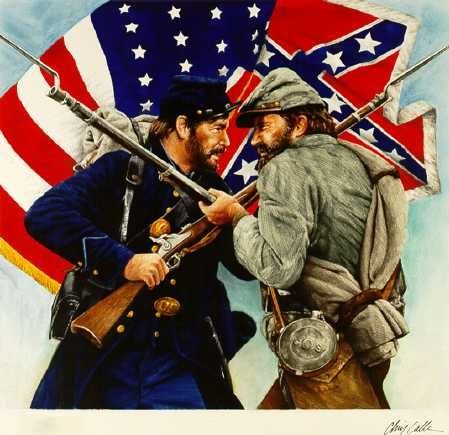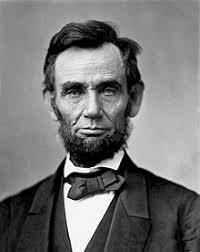1861-1865The Civil War
The Civil War, more commonly known in North America as "Civil War", tore the United States apart for four years and killed 617,000 combatants, far more than any other war that involved the country, including the two world wars.

It ended with the abolition of slavery, the consolidation of American institutions ... and the ruin of the South.
A war of principles
The root causes of the conflict lie in the opposition between the slave South and the industrial North of the country.

On December 20, 1860, in reaction to the election of Abraham Lincoln as President of the United States, South Carolina seceded. With ten other slave states of the South, it soon established a "Confederate States of America", with Jefferson Davis as president and Richmond, Virginia, as the capital.

On April 15, 1861, after a first assault by Confederate forces against a stronghold of the federal government, President Lincoln issued a call to arms.
From the beginning, the Confederates benefit from the rallying of excellent officers, from the aristocracy of the planters. Among them is Generalissimo Robert Edward Lee. These men feel that they are defending their land and their culture, and offer little clout to political interference.
On the other hand, the Union has a comfortable superiority: 22 million inhabitants against 9 million in the South (including 3.7 million black slaves), a military budget and staff twice as high, industrial equipment and a developed transport network, a powerful navy.
Ephemeral Southern Successes
At the first clash at Bull Run on July 21, 1861, the 19,000-strong federal troops had to surrender to 15,000 Confederates.
At the head of the southern troops, the generalissimo Robert Edward Lee is revealed as of that date a remarkable strategist.
It was, however, postponed to Antietam, Maryland, September 17, 1862, in the face of forces twice as numerous (80,000 unionists as against only 40,000 Confederates).
In this year 1862, the Union throws all its forces into the battle. To cover financial needs, the Washington Congress votes for the circulation of banknotes in lieu of metallic money. These first notes are nicknamed "greenbacks" because of their green color. The nickname remained to them. On September 22, 1862, President Lincoln proclaimed the emancipation of slaves from the rebel territory, effective January 1, following.
The South won a final victory at Chancellorsville, between the two capitals, where the Confederate army of Generals Lee and Jackson and the Army of the Potomac were fighting for four days from May 1st to 4th, 1863. General Joe Hoocker, nicknamed "Fighting Joe" (Joe the Battler). In the northern ranks, desertions and vacations multiply. Blacks, made responsible for the war, are even subject to hate attacks and lynchings.
Taking advantage of his success, Lee rises to Pennsylvania, sowing destruction in his way. The Army of the Potomac, commanded by General Meade, is on his heels. Nothing is played yet, even if the balance of power is very favorable in the North.
Gettysburg: the turning point of the war
The turning point of the war is played on the battlefield of Gettysburg, 1-3 July 1863. The Union loses 23,000 men (killed, wounded or captured) during the three days, a quarter of the troops engaged in the battle . The losses of the Southern Confederation amount to 31,000 men, or a third of its workforce. Although indecisive, the battle precipitated the retreat of the southern general Robert Edward Lee.
Shortly thereafter, the northerners commanded by General Grant seized the city of Vicksburg, on the banks of the Mississippi, placing the entire river under the sovereignty of Washington. In a burst on September 19 and 20, 1863, Confederate General Bragg drew the Federal Army into Chickamauga Inlet. But the resistance of General Thomas avoids a defeat to the federal army.
Towards the victory of the Union
Inexorably, the advantage goes to the North. In March 1864, President Lincoln raised General Grant to the rank of Lieutenant-General and gave him command of all federal armies. With the 120,000 men of the Potomac Army, Grant marched against the Northern Virginia Army, which did not exceed 60,000 combatants, under the command of General Lee.
A succession of engagements, in May and June 1864, caused enormous losses on both sides, without bringing a decisive outcome. It's the wilderness campaign.
For his part, General Sherman continues his "walk to the sea" across Georgia. He travels 500 kilometers in 24 days with 65,000 men. It burns everything in its path and on December 10, 1864, savannah book to the flames.
End of drama
As a final bouquet, General Ulysses Simpson Grant seized on April 3, 1865, Richmond, the capital of the Confederates of the South. While Confederate President Jefferson Davis flees pitifully, President Lincoln makes a triumphal entry, acclaimed by black slaves ... and some poor whites.
Lee has more with him than 26,000 men hungry and ragged. Accused near Richmond by the forces of Generals Grant and Sheridan, he attempted an ultimate outing near the village of Appomatox Court House. Beaten, he surrendered to Grant, with generous conditions for his men, authorized to demobilize with horses and mules.
A very heavy balance sheet
The toll of the American Civil War is very heavy. The fighting has mobilized a total of four million combatants. They made 359,000 deaths among the northern victors and 258,000 "only" among the Southerners.
The Nordic generals, with their overwhelming numerical superiority, had no great scruples in launching bloody offensives (as, later, the generals of the First World War). In contrast, the southern command, excellently trained and aware of its numerical inferiority, has spared the blood of his men.
In addition to military losses, there are some hundreds of thousands of civilian casualties. Thus, the toughest war ever fought by the United States has been a civil war. It will have made more American victims than all the wars of the twentieth century, including the two world wars! ...
President Abraham Lincoln receives the surrender of the enemy a few days after being relocated to the White House for a second term. He is preparing to reconcile the South and the North with charity and without revenge but death will prevent him ...